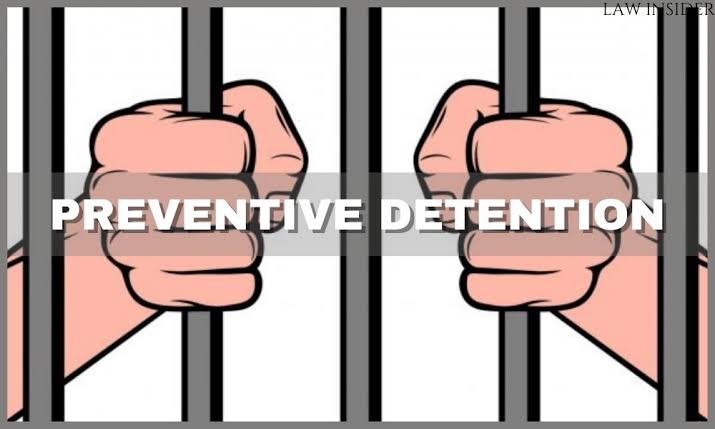
Preventive detention

26.10.2023
Preventive detention , Daily Current Affairs , RACE IAS : Best IAS Coaching in lucknow
|
For prelims: Preventive detention,Types of detention,Cases,AIM,Significance For mains GS paper 2 : CONSTITUTIONAL PROVISIONS, POWERS OF STATE,EXISTING PREVENTIVE DETENTION LAWS IN INDIA,Preventive Detention Act, 1950 |
Why in the news?
The Supreme court, in at least 3 separate instances, has red-flagged the Telangana government’s usage of the stringent preventive detention law.
What is preventive detention?
- Preventive detention means detention of a person by the state without trial and conviction by court, but merely on suspicion.
- The detention could be up to a year unless extended.
- A pre-trial detention is not the same as preventive detention.
- While the former is an undertrial accused of a crime, a detainee can be taken into custody just as a preventive measure even if he has not committed a crime.
- In India, the Constitution itself makes space for preventive detention.
- Part III of the Constitution, which deals with fundamental rights, also gives the state the power to suspend these rights for preventive detention.
There are two types of detention: punitive and preventive.
- Punitive detention is used to punish a person for an offense committed after a court trial and conviction.
- Preventive detention, on the other hand, refers to the detention of a person without the possibility of a trial and conviction by a court.
Preventive detention Famous Cases
- Supreme Court in Alijav vs District Magistrate Dhanbad.
- Ankul Chandra Pradhan vs Union of India
AIM OF PREVENTIVE DETENTION LAW:
- preventive detention is not to punish an individual for a past offence but to prevent them from committing an offence in the future.
- Preventive detention laws are enacted by governments to ensure public safety and maintain social order.
SIGNIFICANCE OF PREVENTIVE DETENTION LAW:
- The Act provides authorities with the power to detain individuals who may disrupt law and order.
- It aims at ensuring the overall peace and stability within the country.
- The Act aims to safeguard the internal security and defense of the nation by allowing authorities to take preventive measures against individuals involved in anti-national activities or potential threats.
- Certain preventive detention laws were enacted to preserve and enhance foreign exchange and discourage illegal activities related to smuggling and money laundering.
CONSTITUTIONAL PROVISIONS RELATED TO PREVENTIVE DETENTION LAW:
- Article 22(1) and 22(2): These provisions ensure that arrested persons are informed of the charges, can seek legal representation, and are presented before a magistrate within 24 hours.
- Article 22(3): However, these safeguards do not apply to enemy aliens or persons arrested under specific laws for preventive detention.
- The 44th Amendment Act of 1978 has reduced the period of detention without obtaining the opinion of an advisory board from three to two months. However, this provision has not yet been brought into force, hence, the original period of three months continues.
POWERS OF STATE WITH RESPECT TO PREVENTIVE DETENTION LAWS:
- The state, which would be the district magistrate, would issue an order to detain a person when it is necessary to maintain “public order.”
- The state can sometimes delegate this power to the police as well.
- For preventive detention, there are very narrow grounds of judicial review because the Constitution emphasises the state’s “subjective satisfaction” when ordering a detention.
- If the detention ordered is for more than three months, under Article 22(4), such a detention requires the approval of an Advisory Board.
- These Boards are set up by states and normally consist of retired judges and bureaucrats.
- A detainee is generally not allowed legal representation before the Board.
- If the Board confirms the detention, the detainee can move Court challenging the detention order.
- Article 22(5) of the Constitution mandates that the state is required “as soon as maybe,” to communicate to the detainee the grounds of detention and “shall afford him the earliest opportunity of making a representation against the order.”
EXISTING PREVENTIVE DETENTION LAWS IN INDIA:
- Among central legislations, the National Security Act, the Conservation of Foreign Exchange and Prevention of Smuggling Activities Act, 1974 (COFEPOSA) are examples of laws under which preventive detention can be ordered.
- As many as 25 states also have preventive detention legislations, like the Telangana law, which is called The Telangana Prevention of Dangerous Activities of BootLeggers, Dacoits, Drug-Offenders, Goondas, Immoral Traffic Offenders, Land-Grabbers, Spurious Seed Offenders, Insecticide Offenders, Fertiliser Offenders, Food Adulteration Offenders, Fake Document Offenders, Scheduled Commodities Offenders, Forest Offenders, Gaming Offenders, Sexual Offenders, Explosive Substances Offenders, Arms Offenders, Cyber Crime Offenders and White Collar or Financial Offenders Act, (PD Act), 1986.
- Other examples are the Tamil Nadu Prevention of Dangerous Activities of Bootleggers, Drug Offenders, Forest Offenders, Goondas, Immoral Trafficking Offenders and Slum Grabbers Act, 1982; the Gujarat Prevention of Antisocial Activities Act, 1985; the Bihar Control of Crimes Act, 1981, etc.
Preventive Detention Act, 1950
- It strengthens human detention in instances involving state conditions, such as national defence, the maintenance of peace and public order, foreign affairs, and so on.
- It was challenged in court in the matter of AK Gopalan versus The State of Madras, where it was clear that an individual's freedom did not qualify as granted under Article 21.
- The Supreme Court, having adopted a narrow view of Articles 21 and 22, refused to consider whether there were any flaws in the legal method.
- In the case of Maneka Gandhi v. Union Of India, the court significantly extended and construed the term "personal liberty" to its widest degree.
- The court stated that Article 21 does not preclude Article 19, and that any legislation depriving a citizen of personal liberty must pass the scrutiny of both Articles 21 and 19.
Source:Indian Express